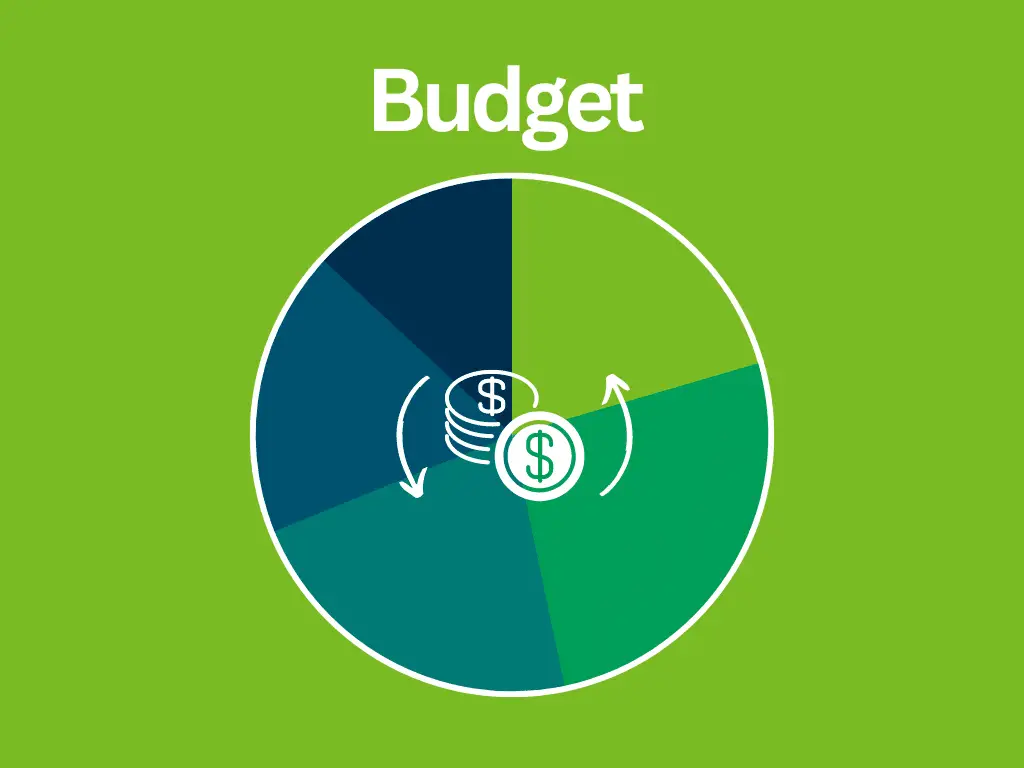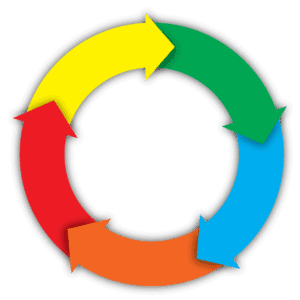The business budget is an essential part of any business and is essential to ensure the financial health of your business.
A well-designed budget helps you track income and expenses, control spending, and make informed decisions about allocating your resources.
Although creating a budget can seem daunting, it doesn’t have to be complicated.
However, you must choose from the following:
- Build your budget yourself
- Use the services of a controller
For more details regarding the three possibilities mentioned above, you can consult the section on how to make a business budget.
Creating a business budget is an important step for any business owner, so this article simplifies all the important aspects you need to know about budgeting.
It is VERY IMPORTANT to have good data for establishing all of your business budgeting. As you will see below, the sales budget is the first to complete to eventually obtain a cash budget.
However, before you can even budget your sales, you need to establish your sales forecast. These must be as precise as possible otherwise your entire budgeting will be biased because as you can see in the image below, all budgets depend on the sales budget and this one depends on sales forecasts.
What is a business budget?
When you want to forecast the next financial period, the tool par excellence is the budget.
A business budget is a financial plan that projects a business’s income and expenses over some time.
Budgets are usually created on an annual or quarterly basis and can be part of an overall business plan.
The corporate budget is also called the master budget. The latter is summed up by a set of budgets that make it possible to obtain the desired result.
Here is an overview of all budgets in a master budget for a manufacturing company:
*Image adapted from Garrison, R. Libby, T., & Webb, A. (2016). “Foundations of Management Accounting”, Chenelière Education.
When you establish a master budget, you understand that using it you will have the following advantages:
- Easier to get financing
- Better financial planning
- Improved decision making
Whasignificantlygreatly help the financial institution to grant you financing is the clarity of the information that you transmit to it.
A master budget improves the quality of the information provided, which increases your chances of securing funding.
Cash management using a master budget avoids cash shortages that usually lead to major problems with stakeholders, for example, financial institutions, suppliers, etc.
In addition, the business budget provides a glimpse of the near future of your business. By completing it regularly and diligently, you have the opportunity to adapt your decision-making to your forecasts.
Every business is different. Thus, certain particularities apply depending on the type of business you operate. For example, it is possible to divide companies into three segments:
- Manufacturing company
- Commercial company
- Service company
Each of the above options has its specifics for establishing a master budget.
However, the manufacturing company is the one with the most steps, moreover, it is the type of company that we presented in the previous image.
To simplify your understanding, here is a summary of all the budgets according to the type of business you operate:
| Manufacturing Business | Commercial Business | All Businesses |
|---|---|---|
| Production Budget | Inventory Budget | Sales Budget |
| Raw Materials Budget | Goods budget | Operating Cost Budget |
| Labor Budget | Cash Budget | |
| Expenses Budget | ||
| Inventory Budget |
How to make a business budget?
To make a business budget, you must choose between doing it yourself or delegating it.
At the beginning of this article, we discussed three possible options for making your business budget:
- Build your budget yourself
- Use the services of a controller
Luckily, you can focus on the core tasks and delegate budgeting for your business. By hiring a controller, you will be able to have someone you trust in-house who will take care of all aspects of the accounting (or almost).
However, hiring someone competent on your team will usually cost upwards of $100,000 per year.
One way or another, it is important to use accounting software, because it will allow you to have clear information and keep it securely in the database of the company that manages the software.
In addition, your controller and your external accountant may use all the information you addin one day. In the context where, for example, his last desire to review the history of your cash flow or your accounting in general, it will be easy for him to find what he needs.
Now, let’s look at these three possibilities in detail.
Build your business budget yourself
As we have shown earlier in this article, the corporate budget is a set of budgets.
The objective of the corporate budget is to obtain a cash budget, as well as projected financial statements (you can return to see the image of the manager budget earlier in the article).
So, we start with the presentation of the budgets relating to all types of companies, then we specify the particularities of the budget of a commercial company and we end with the budget of a manufacturing company because it is the one that has the most steps.
| Manufacturing Business | Commercial Business | All Businesses |
|---|---|---|
| Production Budget | Inventory Budget | Sales Budget |
| Raw Materials Budget | Goods budget | Operating Cost Budget |
| Labor Budget | Cash Budget | |
| Expenses Budget | ||
| Inventory Budget |
Types of budgets that should be made by all businesses
Sales budget
Any business budget should start with the sales budget. To establish a sales budget, you need to be able to estimate what your sales will be for the next financial period.
By financial period, we refer to the next 12 months of your business.
Some sales are not cashed at the time of sale. This is called credit sales and these are better known as accounts receivable.
When establishing a sales budget, in addition to estimating sales for the next 12 months, you should estimate how long it will take to recover your accounts receivable.
The latter is part of the management ratios and these are important in relation to the financial analysis of your company.
Typically, the sales budget is used to forecast cash receipts for sales and credit sales. We have designed a specific article for you to build your own sales budget.
Selling and administrative expense budget
The selling and administrative expense budgeareis partly dependent on the sales budget because some expenses are variable, which means that they vary depending on the level of activity of the company.
Thus, the more sales increase, the more the variable selling and administrative expenses increase. The reverse is also true.
Selling and administrative expenses are part of the cost of running a business.
Examples of selling expenses are sales salaries, advertising, commissions, etc.
In the same vein, administration costs are, for example, rent, property tax, heati,ng and energy, etc.
The purpose of this budget is to establish what will be the disbursements relating to selling and administrative expenses.
Cash Budget
Essentially, all types of businesses must also establish a cash budget.
Since this is a budget that depends on all the other budgets, we will present it after the other budgets, i.e., at the end of the section on types of budgets for a manufacturing company.
Types of budgets to be made by a business enterprise
The commercial enterprise must also establish a sales budget, as well as a budget for selling and administrative expenses.
As we have just mentioned above, the commercial enterprise must also establish a cash budget.
A stock budget must also be drawn up in certain cases. The latter is usually made for a manufacturing company, however, it is possible that it applies to your commercial company, it’s up to you.
The budget that is specific to commercial enterprises is the budget for the purchase of goods.
Unlike the manufacturing enterprise, the trading enterprise does not purchase raw materials to manufacture finished products.
The commercial enterprise purchases, for the most part, finished products. She must therefore make a budget to know how many goods she thinks she will sell because this is what will allow her to estimate the number of goods to buy.
Types of budgets made by a manufacturing company
Let’s go back to the image of the master budget:
*Image adapted from Garrison, R. Libby, T., & Webb, A. (2016). “Foundations of Management Accounting”, Chenelière Education.
This image represents the links between budgets to be made by a manufacturing company. In other words, it is the master budget of a manufacturing company.
Unlike other types of businesses, manufacturing businesses have to produce their goods which they will then sell.
Thus, several budgets are added unlike other types of businesses (commercial or service).
When the sales budget is finished, it is then possible to start these other budgets.
Production budget
In general, the production budget is a plan highlighting the units that must be produced during a given period, to meet demand and inventory needs.
Raw materials budget
The raw materials budget makes it possible to forecast the disbursements relating to the purchases of raw materials that will take place during a specific period.
Beginning with the number of units to be produced and ending with the total disbursements to be expected, the raw materials budget is useful for any manufacturing company that ultimately wishes to establish projected financial statements as well as a cash budget.
The management of the factory’s raw materials is one of the fundamental factors in the success of your company.
Process optimization requires grading your raw materials and you will usually need containers to meet such needs.
Direct labor budget
The direct labor budget forecasts the total cost of direct labor over a period.
With experience and data accumulating, the company can estimate direct labor time per unit, as well as know the cost of direct labor to time.
These two elements are essential to obtain the total cost of direct labor.
Managing the workforce is increasingly complex these days. Fortunately, there are new technologies that can reduce the time you spend managing your human resources.
For example, you can try GoHire for free, a simplified recruitment software designed to help companies attract and manage candidates.
The company offers over 700 job description templates, one-click job postings, hiring automation, and more.
Manufacturing overhead budget
Through the budgeted direct labor hours, the manufacturing overhead budget can be estimated.
The manufacturing overhead budget forecasts the total cash outflows for manufacturing overhead, as well as the pre-determined charging rate for the period.
Inventory budget
The finished goods inventory budget at the end is used to calculate the unit cost of a product.
Then, it becomes simple to calculate the inventory item of finished products at the end in dollars which will be found in the assets of the financial statement of the company.
In addition, this allows you to obtain the cost of sales from the forecast income statement.
Cash Budget
When establishing all the budgets, the ultimate goal is to obtain the cash budget.
In general, the cash budget makes it possible to budget the financial inflows and outflows of a company, which leads to a cash surplus or deficit for a given period.
The advantages of the cash budget are:
- Easier to get financing
- Better financial planning
- Improved decision making
A cash budget improves the quality of the information provided, which increases your chances of obtaining financing.
Cash management using a cash budget avoids cash shortages that usually lead to significant financial problems with stakeholders, for example, financial institutions, suppliers, etc.
Better financial planning will be put in place thanks to the cash budget, which will then allow the budgeting to be compared to reality.
Also, it allows you to glimpse the near future of your business. By completing it regularly and diligently, you have the opportunity to adapt your decision-making to your forecasts.
There is no certainty as to the accuracy of the cash budget, however, you will have a good general idea, which will improve your decision-making in the long run.
When the cash budget is completed, it is then possible to produce the provisional financial statements.
These are the Estimated Income Statement and the Estimated Balance Sheet.
Estimated Statements of Income
The forecast income statement comes from the cash inflows and outflows resulting from the cash budget.
By counting the expected income and expenses, we obtain Revenuesrofit.
Basically, revenues were budgeted according to the sales budget. It can sometimes be difficult to be accurate when making revenue forecasts.
The reason for this complexity is simple. There are a lot of factors that can vary the realization of your income, which explains this difficulty in forecasting sales.
Examples of factors that can affect your sales are:
The sudden loss of a key employee
Economic difficulties of a customer or supplier (the customer is no longer able to buy products from you and the supplier can no longer sell them to you)
Changes in laws that impact your business
The competition is taking market share away from you
Communication error that causes you to lose a customer
etc
Once the statement of provisional results is made, it is then possible to carry out the provisional balance sheet.
Estimated Balance Sheet
Your company’s balance sheet is a picture of what it owns and owes as of a specific date.
Thus, the forecast balance sheet predicts what your net worth will be at a specific time in the future.
As a general rule, this forecast is established according to a time horizon of You mayite possible that you will manage to achieve all the budgets.
However, if you prefer the job to be done quickly and with much less effort, then it makes sense to use accounting software.
Use the services of a controller
When you have enough cash flow to support hiring a controller.
He is able to plan and coordinate the accounting operations of your company.
This person will take care of the budgeting and set up the internal and external financial statements.
In addition, a controller brings added value to the level of the preparation of reports which allows you to make better financial decisions.
Thus, all the accounting tasks and the follow-up relating to the work of the accounting technicians will be done by the controller.
In this order of idea, you will be able to maximize your time even more on what is most important for your business, that is to say, its development and its management.
The importance of budgeting for your business
A business budget is an essential tool for businesses of any size.
The budget allows businesses to allocate their resources, track actual expenses and income, and make necessary adjustments throughout the year.
Budgeting also forces businesses to anticipate upcoming expenses and revenue needs.
These forecasts can help businesses avoid cash flow problems and keepir operations running smoothly.
For businesses just starting out, a budget can be particularly useful for prioritizing spending and tracking where the money is going.
Establishing a budget early on can help businesses avoid overspending and getting into debt.
If you don’t know where to start, just start with the sales budget. You will see that through this article we guide you to establish this budget for free.
Subsequently, the sales budget article will show you what the next step is to finalize your business budget.
We hope this article has been useful to you, if you have any questions do not hesitate to contact us!








